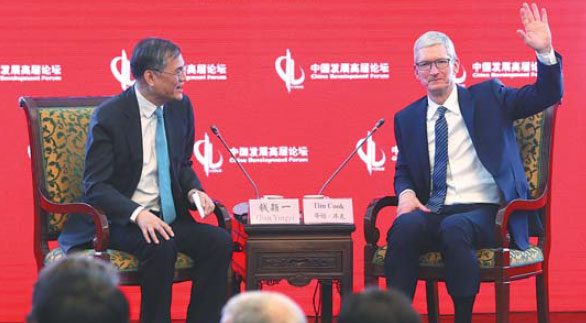Apple to build new research centers in Shanghai, Suzhou
Apple Inc will build two more research and development centers in China, part of its broad efforts to tap into the country's talent pool in manufacturing, design and app development.
The plan came shortly after it established two centers in Beijing and Shenzhen last year, highlighting the importance of the Chinese market, the world's largest smartphone arena where Apple is losing ground to local players such as Huawei and Oppo.
Apple CEO Tim Cook said the two new centers in Shanghai and Suzhou will help the company to work with local partners and academic institutions.
"Talents are China's greatest treasures. Workers in the manufacturing industry, app developers and designers can help Apple develop in China," Cook said at the China Development Forum in Beijing.
The California-headquartered company has committed to investing 3.5 billion yuan ($507 million) in these centers, which will seek graduates of China's leading universities including Peking University, Tsinghua University and Shanghai Jiao Tong University.
Apple's efforts to expand its operations in China show that the country is no longer just a big consumer market, but also an indispensable part of the global research and development community.
During his recent trips to China, Cook held extensive meetings with app developers, a sign of the firm's recognition of China's research capabilities. Apple also invested $1 billion last year in Chinese ride-hailing app Didi Chuxing.
"Chinese developers are already technologically strong, and Apple will offer more help on the marketing side to help them venture into overseas markets," Cook said at the time.
At the forum, the seasoned executive also expressed his view on globalization amid a widespread concern about the reemergence of protectionism.
"Globalization is not helping everyone, and it hurts some people. But it is not because globalization is bad. We have to better our efforts to help more people benefit from it," he said, cautioning against countries retreating from globalization as a response. The comments came as the US President Donald Trump has vowed to revive the American manufacturing industry and has called on Apple to bring back iPhone production. China is a major manufacturing base for Apple. In 2016, iPhone shipments fell for the first time in China on an annual basis.
But the country is still of vital importance, beating the US to become the largest market for Apple's iOS app store last year, according to App Annie, an app-tracker.
In the third quarter of 2016, Chinese consumers spent $1.7 billion through the iOS app store, more than five times what they had spent just two years ago, App Annie said in an email.
|
Apple CEO Tim Cook (right) talks with Professor Qian Yingyi, dean of School of Economics and Management, Tsinghua University, during the 18th China Development Forum in Beijing on March 18. Feng Yongbin / China Daily |

























